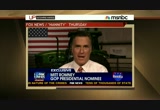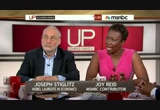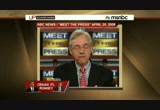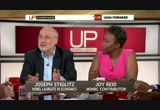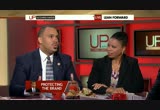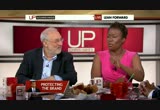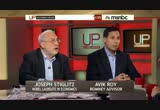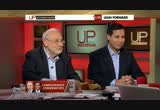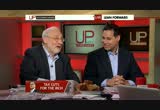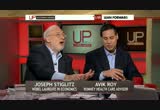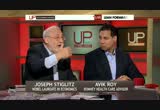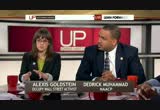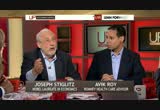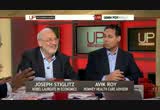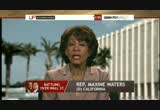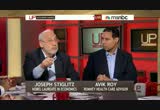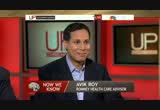tv Up W Chris Hayes MSNBC October 6, 2012 5:00am-7:00am PDT
5:00 am
5:01 am
deregulate. right now it's my great pleasure to be joined by nobel prize winning economist, joseph stiglitz. the price of inequality, how today's divided society eng dangers our future. and joy reid. dedrick muhammad and msnbc contributor karen hunter formerly of the new york and daily news editorial board. now a distinguished lecturer at the film and lecture department at hunter college. mitt romney delivered what appeared to be a pretty stunning victory in the first presidential debate wednesday night. he did this by using a time tested tactic that came as a surprise because it usually happens during the conventions, moving to the middle. at times, romney even got to the left of the president simply by denying, disowning, or apparently abandoning many of the policies he has spent many of the last years competing
5:02 am
with. if he was caught off guard on wednesday, by thursday they had adjusted to the new entrant in the race, romney 2.0. at a rally president obama marvelled at the new software upgrade. >> when i got on the stage i met this very spirited fellow who claims to be mitt romney. but i know it couldn't have been mitt romney because the real mitt romney has been running around the country for the last year promising $5 trillion in tax cuts that favor the wealthy and yet the fellow on the stage last night looked like mitt romney said he did not know anything about that. >> also on thursday mitt romney took another huge step in his unfolding journey of self-discovery. speaking to shawn hennessy on fox news he repudiated the infamous 47% comments he made in may. >> in this case i said something that was just completely wrong.
5:03 am
i absolutely believe, however, that my life has shown that i care about 100% and that's been demonstrated throughout my life and this whole campaign is about the 100%. when i become president it will be about helping the 100%. all right. 100%. we're all in on the 100%. first let me throw it up to you guys. we've been chewing over the debate performance. i think my own take, that the president did not perform well in the debate. that's a real novel take on my part. that's what you tuned in for at home. but i don't think he performed as catastrophically poorly as other people seem to think he did. that's more or less where i'm at. maybe that's not great insightment for real hot talk. >> no, i agree with you. i think you and i might be the only two people who feel like that. i thought it was a goldilocks debate. mitt romney was too hot, barack obama was too cold, but i don't think barack obama splattered on the canvass.
5:04 am
i think he did okay and he was very sort of methodical and purposesorial which is the way he is. he came across with the way people expect him to be without the sense of humor he tends to show in the public. i thought mitt romney was too aggressive with the moderator. i thought he came away like a bully. the only take away people came away from the debate was big bird. usually in marketing, that is a fail. >> i would disagree. i don't think mitt romney was too aggressive. i think he played it very well for himself. he gave space with the moderator to let the people on stage talk. he was willing at every opportunity to get in that extra comment and to almost always even display his own policy and attack obama. i don't think obama did anything catastrophic, he wasn't as on and romney really was. >> i think as a professor, i sort of -- it was nice that we had a wonkish debate with numbers. i wish the numbers were a little
5:05 am
more accurate. >> that's a problem, right. i found myself, as someone who this is my job is to moderate conversations, and also i spend a lot of times thinking about this stuff. there were several points in the debates like i am lost. i am right now lost and this is all i do for a living day in and day out is look at these numbers. i'm like, where are we in the -- >> i actually thought it was very strategic on the part of the president. we have two more of these, right? we know we're a very micro waived society. we only remember the last thing that's said. he played it out perfectly. he did the art of war. all war is based on deception where we're able to attack we must seem unable. i think he was -- no, i'm serious. >> no, i know. i know. i'm glad you're -- this is -- no, i -- >> i have encountered a little bit of the same. >> thank you. >> what we'll see in the next two debates. >> right. >> but certainly having romney commit himself to be in favor of
5:06 am
regulation, not to cut taxes for the top, these are steps in the right direction if he actually lives by them. >> not just that, but the president was able to capitalize the next day. there were ads the next day using those lies. it's like a transcript. we read these things. when we read them we think lie, lie, lie, lie, lie. >> there were a few moments. there are some people who say this is strategic. one of the thing that's interesting in understanding the debate is the continuity of it. we keep being surprised by who barack obama is when he's just been the same the whole time. every time he doesn't fight hard enough. people are like, why isn't he fighting? watch this tape that our producers put together of critiques of barack obama's debate performance in the past. this is not last night's debate. take a look. >> a lot of the pundants are saying this was not a very strong performance last night for barack obama. >> hillary clinton is running as
5:07 am
the tough fighter, and if obama doesn't show democrats he can be a tough fighter against the republican attack machine so called but in fact it is, then, you know, democrats are going to pull back from him. >> subpar performance in the debate by senator obama and a great performance by senator clinton. >> i think they saw john mccain is the tough guy and barack obama is the cerebral guy. >> he seemed to lose control. >> john mccain clearly won this battle on points. >> so this is it every time. i actually thought that he was during the primary a subpar debater. in fact, debate after debate in which he wouldn't throw the punch and this was the big -- >> right. i think part of the issue is romney has been making so many big mistakes and has been so underperforming. a lot of us forgot he can stay say coherent things and can be good at debates and thought that president obama's campaign has been on. >> but this is where the kind of
5:08 am
film clips that you have can be very useful because we can have pictures of romney saying the 47% and now the 100%. >> right. >> that i'm against regulation and i'm for regulation. >> right. >> when you put those clips together like you just did, it really comes out very powerful. you can't control the environment in the way that you could before. >> no. and we remember with hillary clinton, they were saying that obama didn't look up, but he didn't look up in that debate with hillary clinton. >> right. >> again, that is who he is. i think we are totally for getting that. >> not only that, but i think we're also for getting that both of these men, to your point, they were who they always have been, even in governing. barack obama has infuriated his own base because of this perception that he doesn't fight hard enough. >> recurrent theme. >> it's a recurrent theme. with mitt romney the recurrent theme among republicans, the reason he doesn't have a lot of frentsds in his party is the
5:09 am
idea that he's a vicious debater. newt gingrich called him a liar in which he demolished supposedly the best debater in the republican party and he is known to be a flip-flopper. what did he do in that debate, he flip-flopped. everybody played the type. >> dedrick's point is smart about mitt romney in some ways was the beneficiary of lowered expectations and the beneficiary of the success of the obama campaign as painting him as a character of a ba foonish budocrat. by the time john kerry took the debate stage the bush campaign had done such a good job of making him look like a ridiculous figure and then he came out and it was like, oh, right, this is a smart, competent individual who spent his life in the united states senate. it was the same thing with mitt romney. it was a reminder for all of the characture and for all the
5:10 am
reasons he would make a terrible president, he is not an idiot and a ba foon. he can show up at a debate and attack. >> as joanne mentioned, the take away was big bird. big bird has a twitter account that feeds probably joanne's, definitely mine, not yours, the twitter account. that has been the take away. >> i would say the take away, i think the take away has been that romney's back in this. i mean, that was the take away for the 24 hours. i saw all of the oscar the grouch, that was all great, but i think the main take away was that romney's back in this. then we have the jobs numbers. the bad thing for the romney campaign is they only had 24 hours to really run with their new policy there. >> i want to talk about the jobs numbers because they have provoked a really interesting reaction. i also want to talk a little more about this idea of the president's brand and his like wilt and how central and important that's been throughout the career. [old english accent] safe driver,
5:11 am
multi-car, paid in full -- a most fulsome bounty indeed, lord jamie. thou cometh and we thy saveth! what are you doing? we doth offer so many discounts, we have some to spare. oh, you have any of those homeowners discounts? here we go. thank you. he took my shield, my lady. these are troubling times in the kingdom. more discounts than we knoweth what to do with. now that's progressive. starts with arthritis pain and a choice. take tylenol or take aleve, the #1 recommended pain reliever by orthopedic doctors. just two aleve can keep pain away all day. back to the news.
5:12 am
i just finished a bowl of your new light chicken pot pie soup and it's so rich and creamy... is it really 100 calories? let me put you on webcan... ...lean roasted chicken... and a creamy broth mmm i can still see you. [ male announcer ] progresso. you gotta taste this soup. ♪ ♪ ♪ [ male announcer ] introducing a reason...to look twice. introducing a stunning work of technology -- the entirely new lexus es. and the first-ever es hybrid. this is the pursuit of perfection.
5:14 am
we're talking about wednesday night's debate between mitt romney and president barack obama and the performance of both men respectively. i think my take on the president's performance was it was a combination of strategic choices that they make time and time again to above all else, the hippocratic oath of the barack obama campaign from the first day is first do no harm to the president's likability. >> exactly. >> do no harm. everything is subordinate to that. so any attack he might launch, anything aggressive has to be calculated in relation to the possible down side risk of imperilling the president's personal brand as the adult in the room, as the agreeable one, as the rational one, as the never angry person which has a whole intense racial subtext. the positive/negative feelings
5:15 am
towards president obama and mitt romney going into the debate, those are the gains they have consolidated. president 52% likability, 42% negative. and mitt romney was underwater in that respect. so that is a key number for them. that is their watch number. i think that strategic point. i think the president performed poorly in a number of moments. one of the strategic choices i fund frustrating but it's the same strategic choice i've found frustrating from day one was the strategic point as to highlighting differences, talk about similarities. just take a quick look at some of the moments he did that. >> when it comes to our tax code, governor romney and i both agree that our corporate tax rate is too hoo. i suspect that on social security we've got a somewhat similar position. on energy governor romney and i, we both agree that we've got to boost american energy production. >> those are big issues. social security can i just say for the record, the dude that
5:16 am
mitt romney put on his ticket wrote the privatization plan to get rid of social security back during the bush years. so when you're asked about social security you would think you would heighten that contradiction. >> that was the point at which my head probably exploetded the most. i was like, what? yeah, i think you're right. i think if you go back to david axlerod had a lot of experience in running african-american candidates in illinois. he ran barack obama's campaign for statewide office. i think you have to realize that when you're running an african-american candidate in a nondistrict situation, right, there is always this modulation that occurs and that's the way axlerod had always run barack obama. he's always, as you said, he's never angry, always calm. no drama obama. that's part of his personality. >> the two go together. i don't think it completely comes from -- >> but he could have -- what you said, you know, i think this is great that you're agreeing that we should have regulation. i think that's great, but now let's talk about where there's
5:17 am
differences. >> right. >> i think it's great that you're agreeing that we ought to keep social security, but let's ask the question, we want to keep it in the public sector, efficient, make sure we have protection against inflation, protection against stock market volatility. you want to privatize it. >> i thought it was brilliant, actually, because what it did was for the people in his party, in mitt romney's party who are absolutely uncomfortable with him, it brought barack obama closer to him and let him know he's really over here. he's sending a message to another audience that we weren't paying attention to. maybe i'm looking too much into it. i think it was very strategic on his part. >> i don't buy into the whole kind of i strategically lost this. my friends have talked about this rope a dope. he knocked the guy out at the end. and muhammad ali, the next fight he's going to think i suck.
5:18 am
just because you lose the debate, doesn't mean you lost the election. you make it look like you won afterwards. >> which is what george w. bush did against al gore. the next day the bush campaign talked about how al gore lied inside. this whole montage of gore rolling his eyes. and then actually the perception of the debate after the debate was that al gore had lost even though the people who watched it during the debate -- >> and who won the election? >> let's not get ahead of ourselves. >> i doubt the undecided voter is the main population watching the debate. the undecided voter is chearing the spin of the debates. >> big bird, we tend to watch these debates in a different way. one of the points that i have made with people that have called to complain about the president's performance is i would be interested in -- >> they're calling you up? >> i have a had he people that
5:19 am
work in politics. what happened? why? why? one of the things i said is, you know, you have to sit in a roomful of, let's say women, who don't follow this every day and see how they perceived it. because i have had a few people say one of the things we're missing is that the soft performance probably played differently with men than with women and that the president veered off of who they know. >> that's very interesting. >> whereas, the sort of aggressiveness of mitt romney probably played better with men. we have to always look behind what they're doing. i don't think they would strategically let's lose the debate. there are choices they made to be above the fray. >> i think it reflects his personality. and i think over the long run it's better to play honestly and play to who you are. >> right. than to be someone you aren't. because he is not dispositionly a populist slugger. >> on the campaign trail you do see flashes of that. we didn't see flashes of that
5:20 am
during the debate. i'm not saying to fake who he is. >> but he has it in him. >> you're not confronting anyone when you're on stage. >> the other point i make just to piggyback off of what you were saying, karen, in terms of sort of embracing romney and that might be turning off the right. what's so fascinating about the reception to this on the right is that romney substancetively moved to the left, no question, and it's also the moment that he's been most embraced by the right. >> exactly. >> the reason is this, the thing conservatives care the most about is pissing off liberals. the thing that makes them happiest is when liberals are angry at you. if you infuriate liberals by moving to the left and confounding their beloved president, they're going to love you. they don't care. >> one more thing, they don't really worry that he would actually do what he says. >> that's the other thing. that is the big question. >> they know that once he gets elected he'll move back to the right but not as far right as he
5:21 am
was during the primaries. >> at least they think so. >> they think so. >> the larger question, is anyone going to change their opinion based on this quote, unquote, lackluster performance by the president. if you supported him, you might be disappointed, calling joy wondering what happened but you're still going to vote for the president. >> it's the undecided. >> who's undecided in this country? >> wait. the list of the vast left wing conspiracy that mitt romney is doing battle against includes not just climate scientists and pollsters, but a new city set of villains, the gray suited bureaucrats at the bureau of labor statistics. we're going to talk about that right after this. mermaid. honey!? driftwood. come on, you gotta help us out here a little. [ male announcer ] febreze eliminates odors and leaves carpets fresh. ♪
5:22 am
5:23 am
and me discovering novolog mix 70/30 flexpen. flexpen is pre-filled with your pre-mix insulin. dial the exact dose. inject by pushing a button. no vials, syringes or coolers to carry. flexpen is insulin delivery my way. novolog mix 70/30 is an insulin used to control high blood sugar in adults with diabetes. do not inject if you do not plan to eat within 15 minutes to avoid low blood sugar. tell your healthcare provider about all medicines you take and all of your medical conditions, including if you are pregnant or breastfeeding. most common side effects include reactions at the injection site, weight gain, swelling of your hands and feet, and vision changes. other serious side effects include low blood sugar and low potassium in your blood. get medical help right away if you experience serious allergic reactions, body rash, trouble with breathing, fast heartbeat, sweating, or if you feel faint. i would have started flexpen sooner, but i thought it would cost more. turns out it's covered by my insurance plan. thanks to flexpen, vial and syringe are just a memory.
5:24 am
ask your doctor about novolog mix 70/30 flexpen, covered by 90% of insurance plans, including medicare. find your co-pay at myflexpen.com. boproductivity up, costs down, thtime to market reduced... those are good things. upstairs, they will see fantasy. not fantasy... logistics. ups came in, analyzed our supply chain, inventory systems... ups? ups. not fantasy? who would have thought? i did. we did, bob. we did. got it. all right. so there were new jobs numbers yesterday as happens in the first friday in every month. the previous month's job numbers are reported by the bureau of labor statistics, and some interesting things happened.
5:25 am
so the jobs report, it's not that good of a jobs report at all. 114,000 -- not at all. it was not some amazing jobs report. 114,000 new jobs. the big headline number was that unemployment, which is drawn off -- there's two different data sets that they are using, drawn off the household survey. that's the bureau of labor statistics goes out and does a survey of individuals and says, are you working? have you found work? were you not working before? they compute a percentage. the unemployment rate has gone down below 8% which is in some ways a manageable number because mitt romney has been saying on the stump that the president said it was going below 8% and it hasn't so he has to take that out of his stump. in response to this, conservatives, not just fringe figures in the communist red state starting spinning this tale of a conspiracy to cook the books in the bureau of labor statistics.
5:26 am
jack welch tweeted, former cege, who kno -- ceo of ge, he says this is unbelievable. they're messing with the numbers. steve forbes, former gop presidential candidate, berkeley man himself, retweeted it and said, jack is right. and then there was this entire universe. i joked about it. you're out of your mind if you don't think these numbers were cooked. yesterday jack welch went on my colleague "chris matthews show" and this is what transpired. >> you put out the word here, unbelievable jobs numbers, fair enough. these chicago guys will do anything so they change the numbers. what evidence do you have that they got to the bos? the chicago guys got to the bureau of labor statistics and jimmied these numbers by .3%. >> i have no evidence, i just raised the question. >> you came out and asserted not
5:27 am
a question mark or talked about a coincidence, you said these chicago guys will do anything so they change the numbers. do you want to take that back? jimmying with these numbers. there was corruption here, infiltration, getting to the -- it's not funny, jack. you're talking about the president of the united states playing with the bureau of labor statistics numbers. this is nixon stuff. >> chris, don't lose it now. >> i'm not losing it. look at my face. i'm not losing it. >> i can't see your face. >> do you want to take back the charge there is corruption? >> i don't want to take back one word in that tweet. >> i want to make a joke to comcast thank you for making that possible and buying us. >> that was a great exchange. i am sort of amazed by this spectacle. you know, it's not a plausible idea. you worked in the government, in
5:28 am
the white house under clinton. it's absurd. explain to us -- walk us through. we shouldn't have to debunk this, but walk us through why it's not credible, possible, plausible. >> let me give you a story that illustrates why it's so implausible. back when president clinton was running for his second term, the bureau of labor statistics and bureau of economic affairs that comes up with the gdp number were changing the way we measure gdp growth, okay? and they were going to something that is a technical term called chain weighted gdp. >> sure. yeah. >> and the result of going to chain weighted gdp was that the gdp number would be lower than in the old methodology. the president was furious because everyone thought they were coming up with a number that was lower. he said, can't you stop this?
5:29 am
can't you -- can't you wait until after the election? we said, no. they're an independent agency. we can't touch them. what we can do is try to explain what the numbers are. >> right. >> how they're derived, what does chain weighted do. the president then went on a campaign to try to explain -- >> the infamous chain weighted explanation tour. >> that was the high point of the presidency. but the point is no president except maybe nixon would actually try to change what the bureau of labor statistics does or the bea does. these are really independent statistical agencies. the idea that they would do that is -- it's, i say literally absurd. >> in fact, bos is headed by a political appoint tee but there is no political appoint tee m that position. it's actually vacant. right now it's headed up by an interim head who is himself a
5:30 am
career bos person. there's not even a political appointee heading up bos. >> but the history and culture of these independent agencies is extraordinarily strong and it goes throughout -- i'm saying goes through the council of economic advisors which is politically appointed in a sense. senate confirmed. we felt absolutely, you know, very strongly, i think this is bipartisan, that you don't monkey with the numbers because that would destroy your credibility. >> right. >> and the one thing, you know, that we still have is credibility in the numbers. i mean, the one thing after president reagan, they couldn't jimmy with the poverty numbers so they wanted to stop collecting the numbers. that's one thing. you stop collecting the numbers but you don't monkey with them. >> i want to talk about the implications of this. to me this gets to the real core of the way politics is waged and the way the sit zen ri feels about the pillar of
5:31 am
institutions. this is being torn a thunder. the question is whether you can engage in democratic political debates whether this is the ubiquitous feel of people in the country right after this. ♪ hi. [ female announcer ] outlast your day any day. with secret's 48 hour odor protection technology. secret outlast. fire bad! just have to fire roast these tomatoes. this is going to give you a head start on your dinner. that seems easier [ female announcer ] new progresso recipe starters.
5:32 am
5:34 am
we're talking about the conspiracy theory that has been floating around yesterday in response tots jobs numbers that the obama campaign has somehow manipulated these jobs numbers to get the president elected. i joked yesterday this is classic president obama not even jimmying the numbers correctly. he does a half measure. he gets tough and does it the chicago way and he comes up with 114,000 new jobs. but tell me about how does this affect the way that we conduct policy in this country? if people do lose trust, if we do get to a point where you don't think the numbers are trustable, right, and i can imagine -- i've got to say here, i think the incentives are very different on the left and right.
5:35 am
i think there's -- everybody has that impulse to distrust the other party, right? i mean, if the bush administration said something was so, i learned to not think that it was necessarily so and to exercise skepticism, but institutionally on the right there's a lot of incentive for people to stoke that. people can make money and have careers doing that. i think there's less of that on the left, but you end up in a situation where we don't have anything independent, anything that we feel like we can sort of all come around and trust and say these are what the numbers are, let's have a debate on this. >> i mean, there's this whole debate about we can't choose our facts. we can choose our interpretation of the facts. what they're trying to move is where we have to choose our facts. >> right. >> there are other countries where this has become a problem. >> it's a huge problem. >> where there's been a big debate about what the -- >> matriculation rate is, yeah. >> that really has been looked at closely because businesses have to make decisions. workers when they're trying to
5:36 am
decide what is a reasonable wage increase, they have to know what is the adjustment for inflation. so it is very corrosive, you might say, to driving the economy, this failing economy. >> if you can't trust in the numbers. let me make this point as a devil's advocate for people expressing skepticism on the right about these numbers. the number of new jobs found in the household survey, not the headline number of 114,000, it's an a no, ma'am mow louse number, the point is these monthly job numbers, they're estimates. it's a massive economy. they're trying to find using these statistical methods changes in a very large economy. every month afterwards the numbers get revised. they're all over the place. >> in this case they revised the earlier numbers up by some $85, 86,000. this means we have created more jobs in the previous months that
5:37 am
have not been added. you talk about manipulation. they should have increased that number by that amount and that would have even been more accurate, but they didn't do that. that's the best estimate they had at the moment. >> right. also to the adp survey that comes out a little before the jobs numbers. it's almost always more jobs than you end up getting in the bureau of labor statistics. there's questions of the different methodologies of figuring this out. i think what's more pressing for what you were talking about in terms of politics, back when bush was in the office, when the left wanted to escape from the bush administration, they watched "the west wing." they didn't stop believing that bush was president or stop believing that any numbers were true or create their own polls in which job kerry was up by 15 points. where you actually had -- >> there was a little bit of that. >> right. but, i mean, the point is that the right i think has retreated into their own universe. they've created their own metrics of polling. they've retreated into a feel
5:38 am
good universe in which they are winning, they are the majority. barack obama was never elected president. acorn put him in there. >> i think that's the universal impulse. the question is whether it's being cultivated or not. >> i want to say one thing about the difficulties of figuring out how many jobs are really being created. it's not an easy thing as you were saying. one of the problems is that when you turn the economy from, you know, sort of normal growth to either a turning point going up or down, the statistics have a real difficulty. one of the reasons is that the surveys go to typically establish enterprises. >> right. >> but when you have the turning point you're creating new turning points. you're not going to survey those because you don't know where they are. and that's where the household survey picks up things that are not in the establishment survey. >> right. >> on the other hand, one of the real problems is that we have what you call seasonal
5:39 am
adjustments because there's a pattern over the year. before christmas we create normally more jobs. as we go into the summer, college kids in school go into the labor force and then come out. and when you go into a business cycle, theses nal adjustments get -- >> in fact, kathryn rampell, "new york times" reporter, has a great piece that we'll put up about the fact that these numbers, the 800,000 number, which is high and seems somewhat a nam mow louse, may be partly the result of an arrow in the statistical adjustment. people are leaving for college earlier than they used to. >> one of the larger problems here, when facts aren't facts anymore. unfortunately we have a culture that has fostered that. we saw in florida with the election between bush and gore, there was something funny.
5:40 am
9/11. was that funny? should we have gone to iraq. there are a lot of people that have eroded public trust. >> i have more sympathy to the distrust than some others in that institutions have performed very poorly and that's produced some of that trust. joy reid of the grie owe.com and karen hunter, thanks for being here this morning. >> thank you. mitt romney finds his inner mitt romney finds his inner george w. bush when we get back.
5:43 am
the great american fix-up is going on now... ...with new projects every week and big savings every day. so you can do what needs to be done. today. more saving. more doing. that's the power of the home depot. right now, owens corning ecotouch attik insulation is only $11.87 a roll. my story of the week. the return of fuzzy math. the contemporary republican party faces a fundamental political problem, and it is this. the policy position to which the party is most committed also happens to be very unpopular. over the last decade the single most urgent durable domestic policy priority of the republican party is reducing taxes on wealthy americans. if there is one thing you can bank on when the republicans are in power, it is that. happened twice during george w. bush's term in which he pushed
5:44 am
through tax cuts that totaled a combined $2.7 trillion. when the tax cuts were set to expire in 2010, republicans announced they would happily let taxes rise and let unemployment benefits expire which would be unprecedented under such dire positions rather than raise taxes for the top 1 percent percent. they won that standoff leading to $225 billion in tax cuts for the top 1% just over the last two years. once the republicans took the house they moved quickly to vote for the ryan budget which passed the house the first time on a vote of 235-193. it would have cut taxes for those at the top even further. the ryan budget died in the senate. undeterred, ryan unveiled a second version of his budget. this one would have cut $1.76 trillion from the taxes of the top one-half of the top 1% over ten years. which brings us to the current campaign. during the republican primary every candidate in the field offered tax cuts that it turned
5:45 am
out would most benefit the wealthy. a number of the plans proposed, herman cain's, newt gingrich's came right out and said explicitly they lowered taxes for the wealthy and some raised taxes at the bottom quite explicitly. i suppose it is to mitt romney's credit he did not have the most cruelly aggressive tax plan in the primary. it's underappreciated that he is currently proposing at least three major separate tax cuts all of which would disproportionately benefit the rich. first, he's proposing that all of the bush tax cuts be made permanent. the tax cut of $3 trillion for the wealthiest over the next ten years. second, he's proposing to cut the corporate tax rate from 35% to 25%. the tax policy center estimates that just over half of the corporate tax burden ultimately falls on the top 1% so romney's plan amounts to a cut of $43,000 for each household in the top 1%. and then there's the now famous $5 trillion tax cut mitt romney is or at least was proposing
5:46 am
which he says isn't a tax cut because he'll close unspecified loopholes and deductions. we all know inequality is growing. the 1% have pulled away from everyone else and perversely the recovery has only made that trend worse. it violates' voters basic and appropriate sense of fairness to further skew the tax code towards those who are doing the best. in fact, some doing much better year after year than anyone else. why they ask should mitt romney, who makes more than $20 million a year and sits on a fortune of $230 million only pay 14% in taxes? the polling on this is remarkably robust and incredibly consistent. heck, even a majority of republicans support higher taxes for the wealthy as several polls have found. so if you're a republican seeking the highest office in the land, you've got a real problem. on the one hand, you absolutely must advocate for and push through tax cuts for the wealthy knowing full well the electorate as a whole does not like or want them. so what do you do? well, up until this point mitt
5:47 am
romney has floundered a bit, but wednesday at the debate he fully embraced the very effective strategy used by the last man to successfully pull off this particular bait and switch, george w. bush. the center piece was a large tax cut skewed heavily to the wealthy. rather than defend this tax cut to the wealthy, he obfuscated and misled about the tax cuts. >> everybody who pays taxes ought to get tax relief. a of my plan is in place the wealthiest americans will pay a higher percentage of taxes than they do today and the poorest of americans, 6 million families, 7 million people won't pay any tax at all. >> notice the slight of hands. the wealthiest americans will pay a higher percentage of taxes than they do today. not a higher percentage of their income in taxes since that would be an outright lie. very common bit of conservative bit of misdirection used to hide
5:48 am
the distributional tax cuts they're proposing. for instance, even in herman cain's explicitly progressive world of a 9/9/9 flat tax, you can imagine the wealthiest households would still pay a majority of total income tax revenue. that doesn't reflect how progressive or fair the taxation system is. it reflects just how unequal incomes are. bush did it again in the next debate too. >> my plan is that the wealthy people pay 62% of the taxes today after which they pay 64%. this is a fair plan. you know why? because the tax code is unfair for people at the bottom end of the economic ladder. if you're a single mother making $22,000 a year today and you're trying to raise two children, for every additional dollar you earn you pay a higher marginal rate on that dollar than someone making $200,000 and that's not right. >> at the time this drove observers to distraction. bush was running on a huge tax cut for the wealthy and refused
5:49 am
to admit that. paul clugman nearly broke his keyboard. the big lesson we can point out is that a candidate can get away with saying things that are demonstrably untrue as long as the untruths involve big numbers. romney has embraced the substance of bush's domestic policy. now he's come around to embracing bush's style to sell it. confronted with his $5 trillion tax cut which would skew towards the wealthy, romney refused to own the consequences of his own proposal. he used the same share of taxes slight of hand bush got away with. >> i'm not going to reduce the share of taxes paid by high income people. >> romney has an even more sophisticated game than bush had with three principles that are impossible to satisfy together. lower taxes, revenue neutrality and taxes being lowered on high income people.
5:50 am
if you point to one of those cards he waives at the other two. we've seen this before. a lot of good folks got fooled the first time. so it's all the more true that those reporting on this campaign have a duty to make sure voters are not fooled again. we can start by listening to romney himself. >> we're going to cut taxes on everyone across the country by 20%, including the top 1%. >> that was mitt romney before he found his inner bush. but hear me now. if mitt romney is elected president, taxes for the top 1% will be reduced. if i had mitt romney's money, i'd even bet $10,000 on it. we'll see whether nobel prize win sner joe stiglitz or avik roy want to take that bet. begi. ♪ ♪ introducing a stunning work of technology.
5:51 am
♪ introducing the entirely new lexus es. and the first ever es hybrid. this is the pursuit of perfection. and the first ever es hybrid. online outfit piccolo headphones buy now broadway show megapixels place to sleep little roadster war and peace deep sea diving ninja app hipster glasses 5% cash back sign up to get 5% everywhere online through december. only from discover. flavor, meet food. it's time for swanson flavor boost. concentrated broth in easy to use packets. mix it into skillet dishes, for an instant dose of... hell-o! [ female announcer ] get recipes at flavorboost.com. some aerosols may just mix with them. can febreze really remove them? we asked real people what they thought. take a deep breath for me. describe the smell. it's very pleasant. fresh. some kind of flower maybe? remove the blindfold... awww, oh yuck!
5:52 am
5:54 am
this wonderful saturday morning. nobel prize wing economist, joseph stiglitz is with us. i want to bring in avik roy. he's author of "the apothecary." i suggest you check that out for one of the i think best takes on conservativ conservatives. anyone want to take the bet? my bet here is that taxes for the 1%, the wealthiest 1% of households in a mitt romney administration will go down. >> i'm not sure of that. so, i mean, i think some of the things we've talked about, some of the things you talked about in your segment before, it's all about deductions limiting things versus income tax rates. there are a lot of things you can do with deductions. they missed a few things. there are other deductions that the tpc and gayle and other co authors that study will admit. you can get to income
5:55 am
neutrality. >> you can get there though with get with some real political costs which is going after deductions that people really care about, right? i mean, you can do things to charitable deductions. in fact, the president in his first budget proposed capping charitable deductions. what happened was the entire world of universities, catholic charities, everyone else freaked the heck out and it got killed, right? you can go after the mortgage deduction. good luck. go around america and tell everyone that. >> it's worse than that because, in fact, right now with the property market as bad as it is, the real estate market as bad as it is, if you announce that you're going to get rid of the real estate deduction, the mortgage deductions, the real estate market will go down further. >> yeah. >> i think most economists would think in the long run we ought to do it, but we're not in the long run. we are where we are in an economic downturn. to take up your bet, the
5:56 am
question is you have three things that we've been talking about, raising enough revenue, maintaining a degree of progressi progressiveity in the tax system, and promote growth, promote other things we think are really necessities. i don't think that we've heard any proposal from the romney administration that would square these circles. you might do one or two of these, but not all three. in fact, i have been raising that what we'll really do the kinds of things that he says that we'll do. if i were to take up a bet, you look at where the republican party has been, i would, if i had the money romney had, i would be willing to take a bet that, in fact, we will see lower taxes for the top.
5:57 am
let me just take one example that i think -- i wish romney would come out on this issue. warren buffet has said -- >> i want you to hold the warren buffet for a second. i want to dive deeper into this right after we take a quick break. but i'm still stubbed up. [ male announcer ] truth is, nyquil doesn't unstuff your nose. what? [ male announcer ] it doesn't have a decongestant. no way. [ male announcer ] sorry. alka-seltzer plus fights your worst cold symptoms plus has a fast-acting decongestant to relieve your stuffy nose. thanks. [ male announcer ] you're welcome. that's the cold truth! [ male announcer ] alka-seltzer plus. ♪ oh what a relief it is! [ male announcer ] try new alka-seltzer plus severe allergy to treat allergy symptoms plus sinus congestion and pain.
5:59 am
[ male announcer ] try new alka-seltzer plus severe allergy well, if itmr. margin?margin. don't be modest, bob. you found a better way to pack a bowling ball. that was ups. and who called ups? you did, bob. i just asked a question. it takes a long time to pack a bowling ball. the last guy pitched more ball packers. but you... you consulted ups. you found a better way. that's logistics. that's margin. find out what else ups knows.
6:00 am
i'll do that. you're on a roll. that's funny. i wasn't being funny, bob. i know. good morning from new york, i'm chris hayes here with joe stiglitz, winner of the nobel prize in economics and avik roy, a member of mitt romney's health care advisory group. we're talking about tax policy. one of the most central things i think to come out of the debate was debate over mitt romney's proposal for tax policy, which is a 20% rate cut across the board, but he also says there's these other conditions, right, that it will be revenue neutral and that he's not going to lower taxes on people in the high income. and the question is can you get all three of those principles to work together? joe, you were talking about the
6:01 am
broad principles you want out of a tax system, raising revenue, right? we want to raise enough revenue to fund the government, which i don't think we're doing. we have taxes that are a percentage of gdp at a 50 or 60 year low. you want fairness. and you want to promote growth. you were speaking about warren buffet before i cut you off to go to break. >> warren buffet has edicts that are wrong for somebody like him to pay a lower tax rate than a secretary. you tax -- i would feel a lot more comfortable if romney came out and said i agree with that principle. the buffet principle is correct. it's not just a question of fairness, it's a question of efficiency and growth.
6:02 am
because if you tax speculation at a lower rate than people who work for a living, you're encouraging speculation, resources into speculation. the main point i make in my book is paying a high price for inequality that's been generated by a tax code that is distorted towards the rich. a vast majority of these capital gains go to the rich, particularly the taxes on speculation. >> i want to ask you about this because this strikes me as something that liberals worry a lot about, think a lot about, about capital gains. one loophole called carried interest. carried interest is a way in which particularly fund managers can declare the income they derive from managing the funds which looks to all of us like essentially their income, their wages and the capital gains benefit and pay out a 15% rate. that's a loophole that's been protected by democrats and
6:03 am
republicans. chuck schumer has seemed to keep that. rupert murdock i remember tweeting this year he was criticizing that. is that the kind of thing you or the brain trust around romney would like to see that kind of loophole closed? >> i can't remember the exact numbers but i think what it raises for the government is $15 billion or $4 billion. some tiny number that really doesn't do much. i can understand that there's a lot of equity or egalitarianism issues with it. >> the capital gains task overall is very significant. >> what's interesting is that the wall street journal editorial page is constantly complaining that mitt romney isn't aggressive enough about cutting capital gangs. >> paul ryan gets rit of capital gains in his first budget. >> mitt romney doesn't. his focus is on lowering income tax rates which a lot of small businesses pay and lowering the deductions or limiting the itemized deductions.
6:04 am
>> let me grant you the maximal amount of good faith to mitt romney for a second. let me say that he really is committed to revenue neutrality. he is committed to not reducing taxes on the highest income. i don't believe that but let's grant it for the moment. he said this thing at the debate which i thought was right. none of this is passed by the president himself. you have a dialogue with the legislature. you just cannot credibly tell me sitting at this table that a tax bill that comes out of this house republican caucus, they'll let a bill get out of that house without cuts for the top, elimination of the estate tax which is explicitly advocated by the romney campaign, all sorts of other ways in which taxes can be reduced at the top. it's what they're committed to ideologically. it's what their record is doing. i can't see it be the case. >> i completely disagree with that. i think the orthodoxy of the conservative movement on taxes is simplification. lower the rate but also get rid of the swiss cheese. >> all of that. >> make the code simpler.
6:05 am
>> let's talk about what's the orthodoxy and what's the reality? there's an actual governing record of the republican party over the last ten years which has not been, i'm sorry to tell you, simplification. in fact it is punching swiss cheese loopholes into the code. the only consistent theme of the actual republican party record is reducing the burden of high income earners and taxes. it has not been simplification. >> there are lots of other distortions that need to be addressed. you know, one of the things that is a real source of weakening of the economy is the fact that you can move money to the cayman islands or these other tax agents and once you create a trust there, as long as you don't bring the money back to the united states, it's not taxed. and so that encourages jobs, the investment to stay abroad, not to bring the money back to create jobs in the united states. now i'd like to hear dant romney
6:06 am
to say i'm against those kinds of foreign tax loopholes. i'd like to hear him say go back to the estate tax. united states has become the country with the least equality of opportunity of all the advanced industrial countries. more -- less -- a proposal to take away the estate tax would increase the plutocracy of our society. people like warren buffet has said that's wrong. >> yes. >> i'd like to hear romney say i think it's wrong. in fact, he's doing everything to avoid paying the taxes to create a new plu to being kra si. >> there's a fairness argument in the other direction. an immigrant who comes to this country and builds a small business all on his own -- >> nobody creates anything on their own.
6:07 am
>> the post office and all of that. >> they take advantage of an educated population that comes from our public schools. nobody does it on their own. that rhetoric is destructive. >> wait a minute. if they build that business on their own. whatever you want to call it. >> in concert. >> in the flourishing of american society and the community and all the great things that we all love, once that person dies, oftentimes because of the estate tax he has to sell that business instead of passing it on. >> often times this is a tiny, tiny incident. >> the percentage of these people is negligible and we've actually put provisions in our tax code to allow people to spread that over, say in the case of farms, over 14, 15 years. and we can do more. i can understand for that very small number for which that's a problem we have ways of handling that that does not force the sale. >> that brings up a question which i'd like to hear. so i'm a liberal or i'm a
6:08 am
skeptical egalitarian. i'm one of the people i mentioned in the poles in the last hour who doesn't have a big ideological commitment. i do think the equity argument makes sense to me. i think the rich are paying too little in taxes. i'd like to see that go up. you could choose an issue if you were mitt romney, you can choose one, say carried interest which isn't a lot of money, but you can say, you know what, there are some real inequalities in our tax code. i'm going to go after carried interest, or tax hachbs, or preserve the estate tax. you could choose some kind of egalitarian issue but there's nothing he's chosen. >> you're saying two different things that are contradicting each other. he wants to limit the deductions. he's not going to do that because congress will never pass it. you're saying he's not advocating anything that increases taxes or revenues on the rich. that's precisely what limiting deductions do. >> he hasn't -- look, if the thing that was on the table was explicitly limited deduction, we
6:09 am
could debate that. he's hand waived in the direction of limiting deduction as one possible way he might be able to get the math to work. it's like nailing jello to the wall. we can't debate the plan because we don't know what it looks like. >> a number of people in the think tank world have assessed this which claims there's an $85 billion short fall. if you use romney's plan there's $85 billion left over and that the middle class will have to pay a higher tax as a result. first of all, romney has said the middle class will not pay higher taxes. there are a number of other things that the tax policy center didn't consider that amount to 150 to $200 billion of extra revenue that would fall on people over $200 billion a year. >> it's interesting to pay the george w. bush card. one of the ways he got away with the tax cuts was pushing people off the rolls in income taxes. he says there's 7 million people who aren't going to pay income tax.
6:10 am
that's exactly what has produced the infamous 47% who don't pay income taxes. and one of the other things that i have seen develop over time in the think tank world or the thinking of the right which is articulated in romney's 47% comment is the idea that not only, you know, everyone's always wanted to cut taxes, republican party, governor norquist pledge. you need to raise taxes at the bottom and middle class. the tax center says that's what the romney plan does. romney says absolutely not. in the republican party, their plans would do that. there is a lot of ichblt lek actual thinking in the party. that goes to the candidates statements for actually raising taxes at the bottom. not just cutting. >> the basic economics is very simple. if you're committed to reducing the deficit and if you are going to say that we're going to reduce the deficit at least
6:11 am
significantly by more tax revenue, you're in a pickle because you cannot say we're going to get more tax revenue at the same time and we're going to lower everybody's taxes. i mean, that's an inconsistency. unless you do what the first bush always talked about doing is we're going to grow the economy enough to make for t. we know what happened in the first bush administration. they didn't grow the economy enough. >> the truth about one of mitt romney's most galling lines in wednesday's debate after this. i brought your stuff. you don't have to do this. yes i do. i want you to keep this. it'd be weird. take care. you too. [ sighs ] so how did it go? he's upset. [ male announcer ] spend less time at gas stations with best in class fuel economy. it's our most innovative altima ever. ♪
6:12 am
6:14 am
6:15 am
subject of wall street reform. romney complained that nearly two years after the passage of dodd frank key federal agencies have yet to promulgate some of the bedrock legislation that's at the heart of the signature reform. he highlighted mortgage regulation in particular. >> dodd-frank correctly says we need to have qualified mortgages and if you give a mortgage that's not qualified, there are big penalties, except they didn't ever go on and define what a qualified mortgage was. it's been two years, we don't know what a qualified mortgage is so banks are reluctant to make loans, mortgages. try and get a mortgage these days. it's hurt the housing market because dold-frank didn't anticipate putting in place the kinds of regulations you have to have. it's not that dodd-frank always was wrong with too much regulation. sometimes they didn't come out with the clear regulation. >> mitt romney, the private equity titan whose top contributors include some of the top financial institutions in the world capped himself as a
6:16 am
financial crusader of reform. he's right that some of the writers of dodd frank have yet to complete their work. that's been due almost entirely to republican destruction. take the very rule romney championed in the debate, the qualified mortgage rule. the agency charged with writing that rule is none other than the consumer financial protection bureau. it's been besieged by republicans who are trying to neuter it. in an unprecedented move, senate republicans wrote to president obama in april of last year promising to block the appointment of any director for the agency write beings, quote, we will not support the consideration of any nominee regardless of the party affiliation to the cfpb director until the structure is reformed. and in april of this year republicans proposed slashing more than half the agency's budget. the next month they voted to curtail most of its powers.
6:17 am
when president obama obama appointed richard cord gri, mitt romney slammed the administration himself saying in a statement, president obama's consumer financial practices bureau is the most powerful and unaccountable bureaucracy in the history of our nation. instead of focusing on economic growth, president obama is once again focused on creating more regulation, government and more washington gridlock. joining us is alexis goldstein, a former vice president at merrill lynch and an occupy wall street activist and dedrick muhammad from the naacp. i found this moment frustrating as you can maybe tell. what's really interesting to me is there are real critiques to be leveled at dodd-frank, critiques that didn't go far enough, but republicans have tried to pull off this thing and
6:18 am
mitt romney was doing it in the debate where he's kind of appropriating the left critique of dodd-frank and not going far enough in service of essentially defending deregulation and the status quo. here's one example of this. this is mitt romney claiming that dodd-frank enshrines the principle of too big to fail. take a look. >> dodd-frank was passed and it includes within it a number of provisions that i think has some unintended consequences that are harmful to the economy. one is it designates some banks too big to fail and they're effectively too big to fail. this is the biggest kiss given to new york banks that i've ever seen. >> he's talking about specifically the designation of a bank as a systemically important financial institution. the banks have not been told that because they have been spending unbelievable amounts of money fighting tooth, nail and claw and lobbying not to be
6:19 am
designated as a systemically important financial institution because it comes with additional regulatio regulations. what they would prefer as too big to fail banks as they did in 2007, 2008, right, and then be able to just do their thing and get bailed out on the taxpayers' dime. >> i think you make a really good point. >> i do too. >> the wall street thing they wouldn't characterize it as a kiss, this he would characterize it to a knee to the groin. it's just one of the parts of regulations that they have to adhere to. it's enhanced capital requirements, it's leveraged limits. it's a whole bunch of things that mitt romney mentioned in the debate. if it was such a boon, why would the banks be fighting it as you mentioned tooth or nail? >> the real point is it's recognizing reality that these banks are too big to fail. we can't deny that. and -- >> barack obama and mitt romney both supported t.a.r.p., we should note, precisely on that
6:20 am
logic. >> but the real point is it is the republicans especially that resisted doing what really needed to be done about the too big to fail banks which is to break them up. so to now say, you know, if you -- what he should have said, and i would have welcomed that, is to say let's break up these banks. >> yeah. >> that would have been a real turn to the left of mitt romney. >> right. >> that would be a move in the right direction, but to say and to pretend that they are not too big to fail, you're not going to have the kind of regulation and we're just going to let them be is putting us back in the state where we were in 2007 where we know what we will do. >> avik, would you like to see the breakup? >> i don't speak for the romney campaign on any issue, certainly not on banking legislation, but personally, yes. that's why they're too big to fail. there are certain things you can do. the capital requirements are
6:21 am
toothless. they con strain banks and they're very hard for regulators to see what banks own. >> mitt romney endorsed capital requirements. >> capital requirements, it's important to have them, but they have to be soft. not like bobble 3 is is a complete disaster. >> before we get into bobble 3 let me explain what capital requirements are because that seems like a necessary part of this. the nature of being a bank is that you lend more money than you have sitting around at any one moment. that is how a bank works, right. the question is what is that -- how much money do you have to have sitting around? that's essentially what a capital requirement is. how much has to be sitting there so if something terrible happens, you can go into the capital that you have on hand, write that check and not suddenly be insolvent. that's what capital requirements are. i want to talk to someone who is one of the architects behind dodd-frank, congresswoman maxine waters, right after we take this break.
6:22 am
6:25 am
the role it played in the campaign. alexis, we had a brief discussion about what capital requirements are so we're all on the same page. this is part of the problem. it's a problem we face on the program all the time which is dodd-frank sounds obscure. it's very technical, but we just all saw what happened with the crash, right? if we don't get this stuff right, it's massively, massively destructive, and yet it seems that after it all happens, we passed some laws, some stuff happens in the background and that's when the lobbyists come in and that's when all the people who can wield their supposed expertise has this powerful tool to destroy attempts to reign in the banks. if you're home watching and feel like we're throwing around terms, i'll explain them. this stuff is understandable, it really is. it's really, really vitally important. alexis. >> i wanted to mention that mitt romney says he wants more transparency, leverage limits. i was excited to hear that but i
6:26 am
was confused. when people talk about transparency in relationship to the dodd-frank, it's about plus rules. plus execution facilities which are like exchanges where derivatives are supposed to get more transparency. the republicans in the house and the senate have been making themselves very busy trying to gut those rules. this is something i debated on the show. there's a couple of different bills. but what mitt romney said that he wants transparency, he's not consistent with what he sees from his peers in the republican party. >> this is one of the big questions. is there room between mitt romney and i know you don't speak for the campaign on these issues. is there room between mitt romney on financial reform and what is the actual record of the actual republican party which has actually been governing during this period of time which has really been fighting? >> this is really important. let me say that you mentioned before that we don't know exactly the financial positionings of banks. one of the reasons is that
6:27 am
they're engaged in all of these credit default swaps. you go back to the question people were asking in the great debt restructuring was coming up. nobody knew how it would affect american banks. one of the reason is there are all of these over the counter nontransparent and we didn't fix it. why didn't we fix it? because of the bank lobbyists and the republican congressmen that made it essentially impossible to get legislation that would make more transparency. >> and sometimes democrats too. >> sometimes democrats too. >> overwhelmingly -- >> let me just note that there's a reason that they fought that. it's a very lucrative market. we talk about this on the show a lot. the derivatives market -- >> $8 billion a year. one of the principles of economics is very simple. when you have open, transparent markets that become competitive, and the problem with competition is it drives down profits. >> right. >> and, you know, that's bad if you're a bank.
6:28 am
>> highlight for this discussion i think it's highlighting the great opportunity that's missed in the debates. romney's able to throw in real quick and critique president obama for lack of regulation but we never got to hear a defense in the discussion about what's really hang around regulation, why we are where we are. that's what we're having here. but if that's not held out in presidential debates even if it's a complicated subject, to make the statements it's not something american people can use. >> i want to bring in congresswoman maxine waters, democrat of california and a member of the house committee on financial services. congresswoman you were instrumental in developing and writing dodd-frank. i wanted to get your reaction to mitt romney's critique of it during the debate. >> well, thank you very much. i was more than surprised listening to mitt romney distort dodd-frank. as a matter of fact, he knows better with qualified mortgages,
6:29 am
it's so important that we have this feature that we passed in dodd-frank because what we're saying to the banks is this. they must be sustainable. they must be safe mortgages. you must verify the income. you must know about the debt. you cannot have risky features such as balloon payments and interest only and all of that. so qualified mortgages and this issue, this item in dodd-frank is extremely important. what mitt romney did was he basically said the banks are not lending money because of this qualified mortgage feature of dodd-frank. that's not true. first of all, the regulatory agency submitted its regs way back in april and now they're getting public comments. it doesn't go into effect until january '13. he led people to believe that somehow we had put the banks at risk or we were causing them not
6:30 am
to make loans and that is not true. the average american needs to understand that we all aspire to homeownership. we know that. but many people were led into these risky mortgages, these exotic mortgages without having to have their income verified. they didn't understand. they didn't know. they thought it was a chance to own a home but low and behold the devil came due when they could not make the payments. the payments increased because these exotic loans sometimes the interest rates increased by, you know, three fold. really put them in a position where they could not afford them. and so you have all of these foreclosures. that's where these foreclosures came from. that's why we put in qualified mortgages so that the banks would be responsible for making good, safe, sound, sustainable mortgages. and mitt romney had it all wrong and he was misleading.
6:31 am
>> congresswoman, i want to talk about what the next fights are going to be in the next congress over dodd-frank. part of the -- >> i'm sorry, i can't hear you. you're breaking up. >> i want to talk about what the fietsz are -- >> hello. >> i guess i'm completely losing you. let's see if we can fix that. let's take a break and come right back. mething fresh. a clean house. [ woman ] take your blindfolds off. oh!! hahahaha!!! [ male announcer ] febreze car. eliminates odors, so you can breathe happy.
6:32 am
6:34 am
dodd-frank. it's an 848 page bohemuth that's going to be followed by thousands and thousands of pages of new regulations. these new regulations are even invading the freedom of everyday americans, not just the banks and the corporations, but citizens. there's always been something uniquely brilliant about america. i don't believe the president understands this fundamental secret of america and day by day job killing regulation by regulation, bureaucrat by bureaucrat he's crushing the dream and the dreamers. >> mitt romney giving a speech at the university of chicago where that kind of sentiment
6:35 am
goes over very well on march 19th. a very, very different note he was striking than the kind of very warm words that he had for regulation in the abstract of the debate the other night. we have congressman maxine waters on the line and we're talking about this point that mitt romney had maide basically saying it is the delay in promulgating the rules of an acceptable standard mortgage that is the cause of the fact that it's hard to get a mortgage. joe, you seem to be skeptical. >> absolutely wrong. the basic thing is we all knew the direction in which these new regulations would go. those directions are we don't want the toxic mortgages that we had. we don't want the liar loans. those were the things that got us into trouble that required a government bailout. sure there's going to be some fine tuning, but the banks went back to responsible lending where they give a loan, they keep skin in the game. we all know that's the direction we want to go.
6:36 am
that's the direction the banks should want to go if they were going to rely on no bailout. >> right. >> the biggest problem with dodd-frank, the real critique from the conservative view is too big to fail. it enshrines too big to fail. i understand there's regulations around how they manage their businesses which they don't like, but at the other end of the spectrum they have a competitive advantage around small businesses. >> enshrined is a weird word. you can't say it enshrines it unless there's an alternative to getting rid of it. there was a democratic proposal to limit bank sizes. >> let me make a point. there are a number of ways of limiting. we shouldn't get bogged down in the particular way. the point is if romney came out and said i want to limit the size, let's have a good
6:37 am
discussion about the best way of doing it, i would feel a lot better. >> right. >> he hasn't sid that. what he wants to say is we don't want to designate them too big to fail even though they are too big to fail and we don't want to do anything about the too big to fail. >> yeah. >> i also want to make the point, the too big to fail is if a bank goes under. it says we cannot bail you out. you put it into receiver ship, you wipe out the shareholders, you fire manages. , you fire the board, you break it up and you sell everything off. if you cannot sell pieces off the treasury gives you a loan and then the banks have to pay in to pay that loan back. they tried to make it so that the banks had to put into a fund so that the treasury wouldn't need to provide that credit and that was voted no by every single republican in the house. >> that's right. well, this was actually what -- yeah. this is where mitt romney was
6:38 am
absolutely misleading. he talked about we had given 5 big banks a pass. this is absolutely not true. as a matter of fact, these are $50 billion banks and the banks such as aig and what's so important about this is this for the american public to understand, if these big banks fail and we don't have a way of dissolving them in an orderly fashion, they could bring this economy down. this is why we had to bail out all of these big banks and aig, but now with dodd-frank we have an orderly way of dismantling them, of dissolving them and as it was just described, not only do we have all of the rules in place about how you do this, we have the rules in place about how you pay for it. these big banks must have capital requirements. they cannot operate in a risky way without having capital
6:39 am
requirements and this interconnectedness. this puts us all at risk. dodd-frank really does deal with this in a very responsible way. as a matter of fact, what mitt romney was saying was trying to imply that somehow this was going to imperil small banks and regional banks, not true. this is too big to fail institutions. >> congresswoman, let me just express some skepticism. if we have -- there's a thing called a living will in dodd-frank which is what we're talking about. >> yes, that's right. >> you're a big bank and you're systemically important financial institution. you have to say this is how in the event of a crisis you break us up. we can go through the normal process of bankruptcy. the skepticism i have is if there's this big panic, and people are saying if you do this which is what happened at lee man, all of that stuff is going to fly right out the window.
6:40 am
i guess i don't have trust in the political system to resist the pressure that will be brought to bear in the actual moment of crisis. so i want you to respond to that right after we take this break. >> all right. thank you. >> great point. ♪ [ male announcer ] it started long ago. the joy of giving something everything you've got. it takes passion. and it's not letting up anytime soon. at unitedhealthcare insurance company, we understand that commitment. and always have. so does aarp,
6:41 am
an organization serving the needs of americans 50 and over for generations. so it's no surprise millions have chosen an aarp medicare supplement insurance plan, insured by unitedhealthcare insurance company. like all standardized medicare supplement plans, they help cover some of the expenses medicare doesn't pay. and save you up to thousands in out-of-pocket costs. to find out more, request your free decision guide. call or go online today. after all, when you're going the distance, it's nice to have the experience and commitment to go along with you. keep dreaming. keep doing. go long.
6:42 am
to go along with you. customer erin swenson bought so, i'm happy. today. sales go up... i'm happy. it went out today... i'm happy. what if she's not home? (together) she won't be happy. use ups! she can get a text alert, reroute... even reschedule her package. it's ups my choice. are you happy? i'm happy. i'm happy. i'm happy. i'm happy.
6:43 am
i'm happy. happy. happy. happy. happy. (together) happy. i love logistics. chip worked with senator ted kauffman, the delaware senator who wanted to break up the big banks tweets me to make the point was that the obama administration opposed brown kauffman. so this wasn't entirely at all a partisan thing. it came up against a lot of resistance in a lot of parties to break up the big banks. congresswoman waters, talk me down from my concern about the fact that if we get to a crisis, that basically size is the issue and everything is subsidiary to that. if we still have these big banks, even if we designate them, when the rubber hits the road and the crisis is at the door and everyone's hair is on
6:44 am
fire, we're still just going to write them a blank check. >> no. absolutely not. first of all, you have to understand that when we experienced this crisis in this country with the failure of lehman brothers and all of a sudden we saw that our economy was at great risk, we were on the road to a depression, we didn't know what to do. nobody -- we had no rules. >> right. >> for how to deal with this so it has been very complicated and a lot of hard work, but we came up with dodd-frank and we came up with the designation so that we can have the living wills as a part of how we dissolve these institutions. we have come a long way from where we were when lehman brothers failed, so you've got to give it an opportunity to work. we can't say that we can't do anything or that we simply want to break up the big banks and
6:45 am
because we've not been able to do it in the way that some of us would like to do, that we can't trust that the living wills and all of that that we put in place will help to dissolve these institutions. but i think you've got to give it a chance. i think we've come a long way. >> the one thing that's interesting, it was just written about. they're actually starting to price in the resolution authority. >> wait. >> let me break down what i mean by that. the credit default market is insurance on companies or contracts going belly up and -- >> it's a lot of two sided bets. are you going to go bankrupt or not? basically dedrick and i make a bed bet, is alexis going to go bankrupt or not. >> people look to see what the overall health is. >> the likelihood of you going bankrupt? >> exactly. they're starting to price in this idea that the resolution authority will make senior bond holders take a hit.
6:46 am
>> when we're making about bet about the likelihood of big institutions going belly up, we're making the bet with the knowledge that if it does go belly up we won't get protected. the person has to east some of the costs of that because the taxpayer won't come in. this is reflecting the markets when they're pricing the risk of bankruptcy of the big institutions are starting to price in the fact as the congresswoman said there is going to be a penalty. they won't get bailed out. i want to thank maxine waters, democratic congresswoman. i'm sorry we have to go. come by our table any time you're in new york. we'll have you on. congresswoman maxine waters from california. >> thank you. all right. a follow up to my exchange with rudy juligiuliani this week rig after this. what? [ male announcer ] it doesn't have a decongestant. no way. [ male announcer ] sorry. alka-seltzer plus fights your worst cold symptoms plus has a fast-acting decongestant to relieve your stuffy nose.
6:47 am
thanks. [ male announcer ] you're welcome. that's the cold truth! [ male announcer ] alka-seltzer plus. ♪ oh what a relief it is! [ male announcer ] try new alka-seltzer plus severe allergy to treat allergy symptoms plus sinus congestion and pain. [ female announcer ] charmin ultra soft is so soft you'll have to remind your family they can use less. it's made with extra cushions that are soft and more absorbent. plus you can use four times less. charmin ultra soft.
6:48 am
plus you can use four times less. extra curricular activities help provide a sense of identity and a path to success. joining the soccer team. getting help with math. going to prom. i want to learn to swim. it's hard to feel normal, when you can't do the normal things. to help, sleep train is collecting donations for the extra activities that, for most kids, are a normal part of growing up. not everyone can be a foster parent... but anyone can help a foster child.
6:49 am
6:50 am
their seven-day strike in september. 79% ratified the contract which includes pay increases and a new teacher evaluation system. the teachers will get a 7% raise over the three-year term. the mayor of chicago, usually we do now we know. but today i wanted to take a moment to tie up a loose end. after the debate on wednesday night, former mayor rudy giuliani and i had a somewhat contentious exchange. the mayor was making a case for smaller government, to stop as he put it feeding the beast. and i asked whether contracts would save homeland security or contracts his consulting firm secures with government count as feeding the beast. he said i was engaging in a personal attack and i was flat out wrong, that his firm had no contracts with dhs and took no money. i vastly overestimated the
6:51 am
business his firm does with the federal government. giuliani representative told us yesterday his firm is also not pursuing any federal contracts either for itself or any of its clients. but while he was correct he never had a contract specifically with dhs it is true in 2002 his consulting firm received a $1.1 million contract from the justice department. given how much revenue his firm brings in, that hardly represents a major part of its business but it's not nothing either. more broadly mr. jaul onny's consulting business has had clients like a software company who themselves sold products or devices to the federal government landing contracts worth millions of dollars. the point here really isn't about mr. giuliani. i raise the issue because mr. giuliani, romney, most republicans draw a sharp line between the private sector and the vicious and predatory public sector while at the same time advocating for $2 trillion more in defense spending. they also overseen the creation
6:52 am
of a vast, largely privately contracted world of surveillance and security that provides a whole lot of private sector jobs and healthy paychecks from the taxpayer dime. we shouldn't pretend that the public and private sector exist in two different worlds. the overlap is increasing and there's a good lot of private profit to be made by navigating the borders between the two. i can appreciate mr. giuliani was taken aback that i broached this when the topic at hand was the debate. i would love to have the former mayer to accept our invitation to explore the issue further and in depth. i want to find out what my guests know now that they didn't know when the week began. alexis grold steen. >> they are putting their bodies between bulldozers and clear cuts to prevent the southern part of the construction of the keystone excel pipeline. it's an incredible story. we saw actress daryl hannah get arrested, 20 something named maggie get arrested for sitting
6:53 am
up in a tree and she's facing $11,000 in bail aa 78-year-old great grandmother who is charged with trespassing on her own land for trying to stop construction of the keystone excel. >> we followed the keystone pipeline. everybody anticipated it would be built and there was a tremendous amount of organizing and social movement energy put behind blocking it. >> yes. >> its fate remains unclear and this is another part of the direct action strategy to make sure it doesn't get built so that the tar sands and all the carbon don't get released into the air. >> what we watch the people to know is understand there are government programs out there that are designed to help people recover from this massive foreclosure crisis and wall street crisis we've been talking about. one is the independent foreclosure review. i want to get this out. by december 31st if people don't apply for the program you'll lose your toon to get the assistance. the assistance is for those who went through some type of
6:54 am
foreclosure proceeding in 2009, 2010. they can call the phone number 888-952-9105. because a big concern is that these programs will pass and the average american will never get the opportunity to get some of the damages they need to help recover and move the economy forward. >> this is -- deadline november -- december 31st, the end of this year. we'll put that on our blog and tumbler and tweet that out. that's if you've been through foreclosure and looking for assistance. joe. >> i think what we learned this week is both candidates seem to be concerned about having a fair tax system. the real challenge is given the fact that america has become the most unequal society, given the fact that america has become advanced industrial country, the country with the least equality of opportunity, it seems to me an interesting question to get the two candidates to try to express how it is that they're
6:55 am
going to achieve this objective. not only through the tax code but through expenditure programs. >> yes. >> how are you going to deal with the fact that, you know, in many ways inequality in our society has gone way up and equality of opportunity has gone way down. >> i think that's really important. the price of inequality is fantastic. i recommend to everyone watching. some of the things in my own book, which is not written by a nob nobel laureate. actually produces decision function in the institutional crisis and i think this is a great book for people to pick up. >> we learned that miguel cabrera is one of the greatest hitters in the history of baseball, triple crown, the first player in 45 years to lead a league in batting average, home runs and runs batted in. incredible accomplishment. congratulations to miguel cabrera and go tigers.
6:56 am
>> all the saber metric heads are tis-tis'ing. my thanks to alexis goldstein, dedrik muhammad, joseph stiglitz, and roy, always great to have you here, adviser for mitt romney. join us tomorrow, sunday morning at 8:00. i'll have congressman peter welch and others. coming up next is melissa harris perry. and an open letter to george will, the columnist who said america will re-elect president obama primarily because we are a nation unwilling to give up on our first black president. melissa has a response. that's melissa harris-perry coming up next. see you tomorrow at 8:00. thanks for getting up.
229 Views
IN COLLECTIONS
MSNBC West Television Archive
Television Archive  Television Archive News Search Service
Television Archive News Search Service 
Uploaded by TV Archive on

 Live Music Archive
Live Music Archive Librivox Free Audio
Librivox Free Audio Metropolitan Museum
Metropolitan Museum Cleveland Museum of Art
Cleveland Museum of Art Internet Arcade
Internet Arcade Console Living Room
Console Living Room Books to Borrow
Books to Borrow Open Library
Open Library TV News
TV News Understanding 9/11
Understanding 9/11


